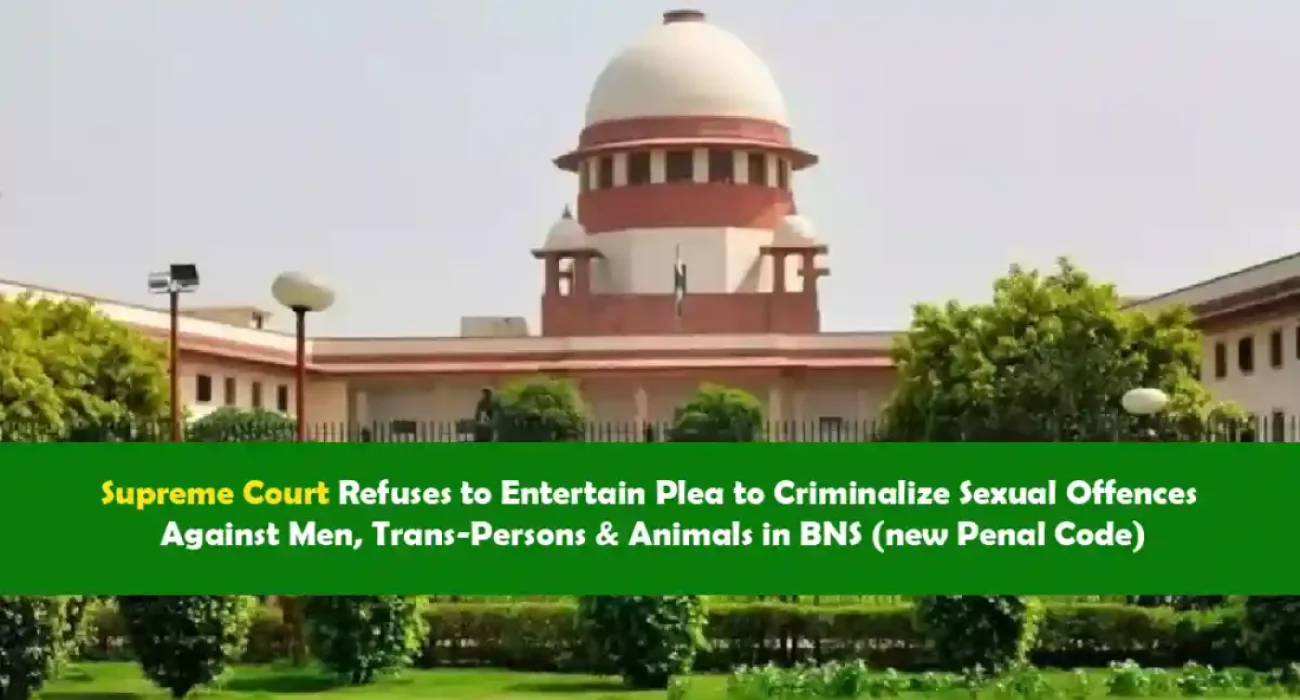

Trans-Persons & Animals in BNS (new Penal Code)
Table of Contents
ToggleOn October 14, the Supreme Court of India refused to consider the PIL which prayed for restoration of criminal sections related to sexual offences against men, transgenders and animals under the newly enacted Bharatiya Nyaya Sanhita (BNS) replacing Indian Penal Code (IPC). The petitioner sought under Article 142 of the Constitution to be directed to fill a lacuna perceived to have been left behind by the deletion of the former Section 377 of the IPC under which the is made an offender for non-consensual sodomitical intercourse with any man, woman or animal.
The IPC was replaced with the BNS, the petition pointed out that BNS does not incorporate the provisions relating to sexual offenses against men (cis and transgenders) and animals. The earlier criminal provisions of Section 377 of the Indian Penal Code that banned ‘unnatural sex’ accompanied by carnal intercourse were recently abolished by the Supreme Court. According to the petitioner, the non-provision of such provision in the BNS will create a legislative lacuna in responding to the non-consensual sexual offences against such groups.
The petitioner’s counsel pointed out the fact that the BNS does not provide provisions against non-consensual sexual acts against all male persons, transgender and animal. This formulates a deficient legal framework to protect the above-mentioned vulnerable groups of people. Citing P. Ramachandra Rao v. The petitioner of the State of Karnataka they argued claiming that in case there is a legal vacuum, such Court has a power to formulate appropriate rules. The counsel also referred to a report of the Parliamentary Standing Committee which highlighted the difficulties caused when Section 377 was removed and which suggested its retention at least for the time being in the light of the stated mission of the BNS on gender neutrality regarding offences of a sexual nature.
A bench led by the Chief Justice of India DY Chandrachud and Justices JB Pardiwala, and Manoj Mishra held that they cannot direct the introduction of a particular offence. Chief Justice also pointed out that according to Article 142, SCP does not have the power of making Parliament enact laws or to establish criminal offenses. Justice Chandrachud said that the Parliament has
not introduced the provision, “It is for the parliament to bring the provision, if at all, and cannot create an offence.” The Court said that such actions clearly fall within the realm of the Parliament.
The Supreme Court, however, declined to entertain the petition while allowing the petitioner to address the legal representations to the Union of India. The petitioner has real concerns of legal lacunas. The Court pointed out that the petitioner has the right to approach the Union if there is perceived legislative gap; the door is therefore open for the petitioner to continue with the matter through proper channels of the Government.
In the recent report by the Parliamentary Standing Committee, the fact is that Navtej Singh Johar only set aside Section 377 in relation to consensual sexual activities of adults. The contents of the report as well as the rationale behind the elimination of the provisions of non-consensual carnal intercourse are to achieve some of the gender-neutral legal targets enshrined in the BNS.
This refusal of the Supreme Court to entertain the PIL reminds us of the principle of the separation of powers between the judiciary and the legislature that means that the Court is not at liberty to compel Parliament to enact specific criminal provisions. The case, however, raised the issues of legal protection for men, transgender and animals in the new law that was put forth for consolidation and consequently provoked the further debates regarding gender-susceptible legal changes in criminal law.
– Credits: By Anaida Khan Pursuing 5th year of BALLB (Hons.) from Dharmashashtra National Law University, Jabalpur
IAW resources
Browse our help directory